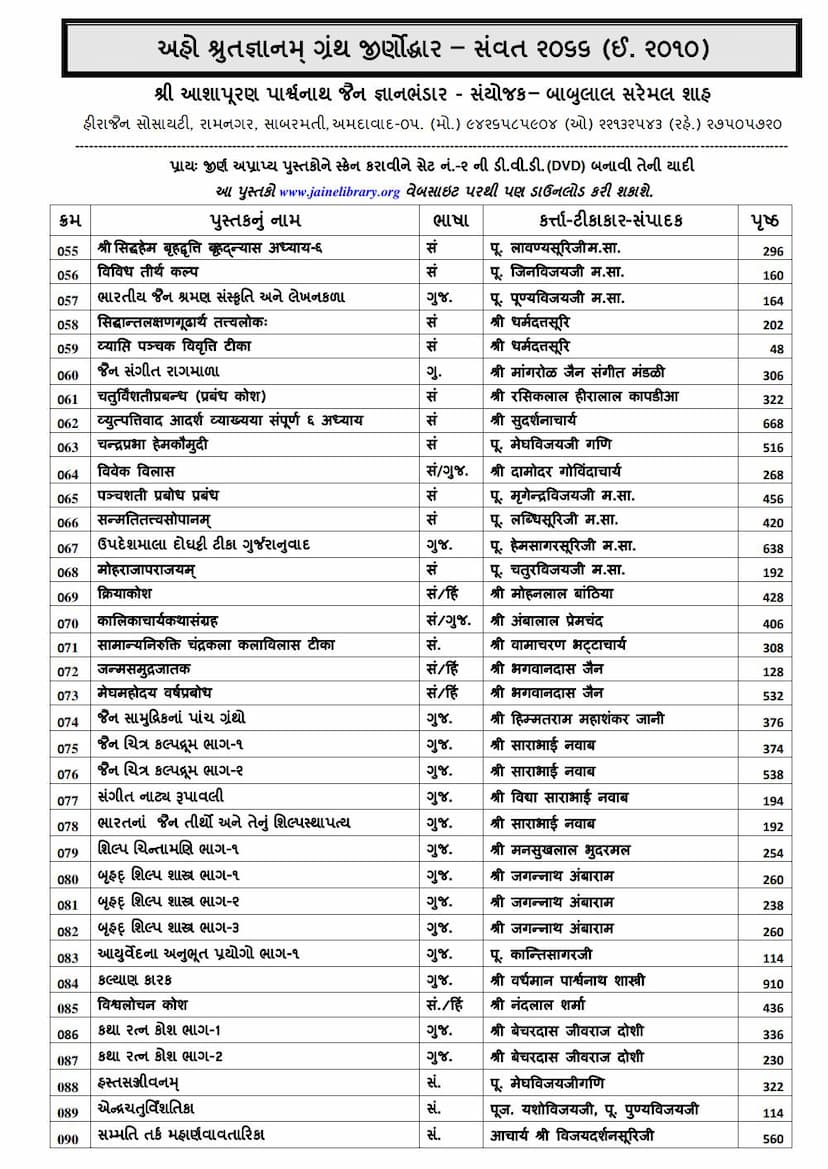Vishwalochana Kosha
Added to library: September 2, 2025

Summary
Here's a comprehensive summary of the Jain text "Vishwalochana Kosha" by Nandlal Sharma, based on the provided catalog link and pages:
Book Title: Vishwalochana Kosha (also known as Muktavali Kosha) Author: Nandlal Sharma (Compiler/Translator) Original Author of the Kosha: Shridharasen Acharya Publisher: Balkrishna Ramchandra Gahenakr (for the edition referenced in the catalog), Gandhi Natha Rangaji (publisher of the 1912 edition). Catalog Link: https://jainqq.org/explore/009534/1
Overall Purpose and Nature of the Text:
The "Vishwalochana Kosha," also referred to as "Muktavali Kosha," is a significant Jain lexicographical work. Its primary purpose is to serve as a comprehensive Sanskrit-to-Sanskrit thesaurus and dictionary, listing various Sanskrit words with their diverse meanings. The text aims to preserve and promote the richness of the Sanskrit language, which is crucial for understanding ancient Jain scriptures and philosophical texts. This particular edition, compiled and translated by Nandlal Sharma, includes a Gujarati translation (language commentary) for wider accessibility. The work is presented as a valuable resource for scholars and anyone interested in Sanskrit literature and Jain traditions.
Key Features and Content:
-
Lexicographical Compilation: The core of the "Vishwalochana Kosha" is its extensive collection of Sanskrit words. It goes beyond simple definitions by providing multiple meanings and nuances for each word, highlighting its semantic range.
-
Original Work and Commentary: The underlying "Kosha" was originally authored by the Jain scholar Shridharasen Acharya. Nandlal Sharma's contribution lies in compiling, editing, and, notably, providing a Gujarati commentary for the text. This commentary makes the complex Sanskrit meanings more understandable to a Gujarati-speaking audience.
-
Extensive Coverage: The text is structured alphabetically, likely covering a vast array of Sanskrit vocabulary. The provided pages (296, 160, 164, 202, etc.) suggest a substantial work, with the index entries (like "Shri Siddhem Bruhaddati," "Vividh Tirtha Kalp," "Bharatiya Jain Shraman Sanskruti," "Siddhantalakshan Gudarth Tatvalok," etc.) indicating a focus on Jain terminology, philosophy, culture, and literature, alongside general Sanskrit words.
-
Emphasis on Detail and Depth: The "Preface" (Prastavna) highlights the importance of lexicographical works ("Kosha") for scholars, comparing their necessity to that of a treasury for kings. It notes that this "Vishwalochana Kosha" aims to fulfill some of this need by providing detailed meanings, often more extensive than found in other lexicons. An example is given comparing the word "ruchaka," which has multiple meanings listed in this Kosha compared to other dictionaries.
-
Scholarly Effort and Challenges: The preface details the extensive effort involved in compiling and editing the text. It mentions the process of obtaining and comparing multiple manuscripts from various sources (like Eider, Ara, and Jaipur) to ensure accuracy and completeness. The compiler acknowledges the difficulty of editing an unpublished and obscure text from potentially corrupt manuscripts and seeks forgiveness for any remaining errors, while emphasizing the diligence applied.
-
Historical Context: The 1912 edition is mentioned as being published by Gandhi Natha Rangaji and printed at the Nirnaya-Sagar Press. This provides a historical context for the text's dissemination. The compiler, Nandlal Sharma, mentions that the time period of the original author, Shridharasen Acharya, is not precisely known from the available inscriptions or texts.
-
Relevance to Jainism: The text is firmly rooted in Jain tradition. The author, Shridharasen Acharya, belonged to the Sen-sangh, one of the four monastic orders of the Digambara Jain tradition. The work is seen as a contribution to enriching and clarifying Sanskrit literature, which is vital for Jain religious and philosophical study. The compilation process itself was inspired by the need to preserve ancient knowledge, as indicated by the project title "Aho Shrutgyanam" (Oh, the knowledge of Shrut/Scripture).
Key Information Gleaned from the Pages:
- Re-publication/Restoration: The text mentions "Granth Jirnoddhar – Samvat 2066 (i.e., 2010)," indicating a restoration or re-publication project by the Shri Ashapurana Parshvanath Jain Gyan Bhandar in Ahmedabad.
- Sponsorship/Support: The restoration project was supported by the Jinagna Aradhak Sangh, Mithakhali (Navrangpura), indicating community involvement in preserving this knowledge.
- Catalog Contents: The catalog itself lists various important Jain and Sanskrit works, including philosophical treatises, historical texts, and cultural studies. "Vishwalochana Kosha" is listed as item number 85, compiled/translated by Nandlal Sharma.
- Extensive Entries: The listed entries (like "Shri Siddhem Bruhaddati" on grammar, "Vividh Tirtha Kalp" on pilgrimage sites, "Siddhantalakshan Gudarth Tatvalok" on Jain philosophy, "Kriya Kosh" on rituals, "Kalikacharya Kathasangrah" on historical figures, and various musical and architectural texts) demonstrate the broad scope of knowledge preserved and made accessible through this collection.
- Detailed Word Entries: The sampled pages from the "Kantavarga" (section on words starting with 'ka') show an exhaustive listing of words, their grammatical forms, and multiple meanings, often with examples or references to other works (like Amar Kosh, Medini Kosh).
In essence, "Vishwalochana Kosha" is a vital scholarly endeavor to make the rich Sanskrit lexicon, particularly as it pertains to Jainism, accessible through a detailed commentary and compilation. Nandlal Sharma's work is a crucial bridge for understanding these ancient texts in Gujarati.